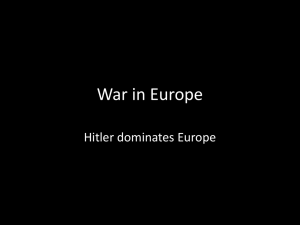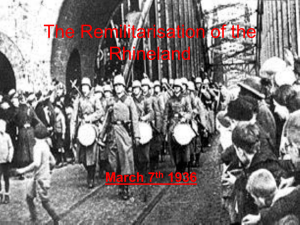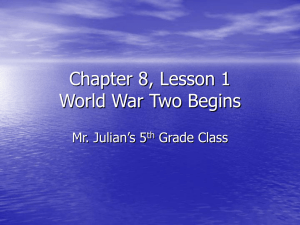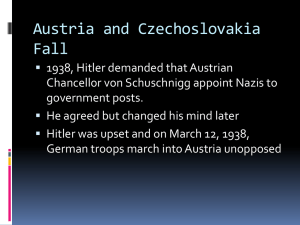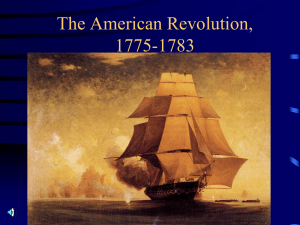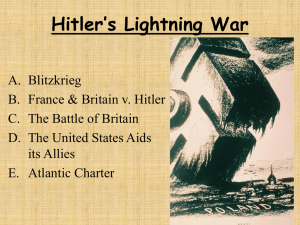Success of British Foreign Policy
advertisement
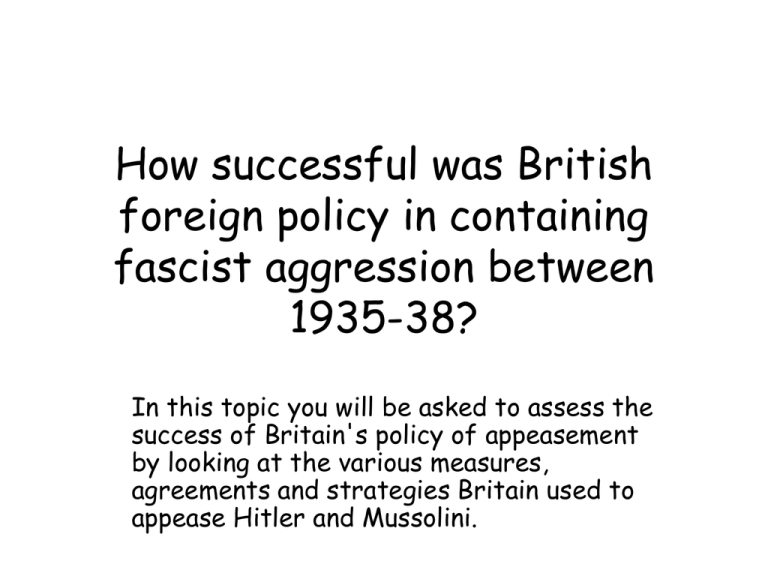
How successful was British foreign policy in containing fascist aggression between 1935-38? In this topic you will be asked to assess the success of Britain's policy of appeasement by looking at the various measures, agreements and strategies Britain used to appease Hitler and Mussolini. The attack on Abyssinia by Italy • How did Britain deal with this attack? • In order to avoid war Britain decided to try and end this conflict peacefully. • The trade embargos, especially oil, were futile as many nations continued to trade. • Italy stated previously that any oil embargo would be seen as a an act of war • Britain were also very concerned about the prospects of a war in Africa • Britain and France were also trying desperately hard to stop Mussolini and Hitler becoming a joint force • Britain decided to act out with the League of Nations and with France, offered a solution to war Hoare/Laval plan • Created by French and British Ministers Pierre Laval and Sir Samuel Hoare • Idea was to offer Mussolini parts of Abyssinia if he agreed to withdraw • Plan was not discussed with Abyssinia • British public not happy with this policy as it neglected the Abyssinians in favour of Mussolini • Public outcry leads to the resignation of Hoare and the withdrawal of the offer. • Mussolini continued with his plan and gained control of Abyssinia. • The League had shown weakness in dealing with this aggression • Britain and France were in no position to stop Mussolini • Collective security had failed to support a League member • Britain and France had shown their lack of support to the League therefore everyone lost faith in it and started to look after their own self interests. German Rearmament • Germany’s rearmament programme showed once again British self interest • Hitler began rearming which was against terms of T.O.V • Britain, in order to protect her shores and colonial trade, signed the Anglo-German Naval Agreement • This was a clear sign of acceptance of the German programme • Britain had after all just signed the Stresa Front agreement condemning German rearmament • British argument for this agreement was that it allowed them to “control” the speed of the rebuilding programme • However, many argue that it showed weakness and an unwillingness to confront Hitler The Remilitarisation of the Rhineland • In 1919 under the terms of the Treaty of Versailles, the Rhineland area of Germany had been demilitarised in order to offer France the security they craved. • In March 1936 Hitler ordered the remilitarisation of this area, even though it was against both the terms of the Treaty of Versailles and the Locarno agreement • What did Britain do???? British Reactions • Firstly, the area was demilitarised for French security. • France were in no position to stop this remilitarisation, they needed their allies Britain, Italy and Belgium to offer their support. • France also had in place the Franco/Soviet Treaty 1935 • Hitler believed this broke the terms of Locarno and threatened Germany • France was of the belief that the German armed forces had become too strong. • Many politicians in Britain believed Hitler was right in entering the Rhineland • No agreements had been broken as France had in many opinions “provoked Hitler” by their agreement with Russia. • Britain were also wanting Hitler to return to the L.O.N • Therefore, attacking him for this seemingly harmless invasion, seemed wrong. • Public opinion in Britain was also in favour of Britain's non intervention • Germany it seemed had done no wrong by remilitarising their own land. • Public also felt the T.O V was too harsh on Germany • Government felt this remilitarisation would pacify Hitler and get him to agree to other more important issues such as a limit on his aircraft and stop to bombing • He had also offered a 25 year non aggression pact • The threat of Communism posed a much more serious issue to Britain. • Hitler had not committed any act of violence • If instigated and possibly deposed WHO would be his replacement • Britain also found itself not to be in a position of strength, Hitler had acted on a Saturday when government was on holiday • By the time Britain reacted Hitler had completed his move • The army was also not prepared to fight a resurgent German army. • For these reasons a policy of appeasement seemed the best way forward for Britain Spanish Civil War • How did Britain deal with the outbreak of the Spanish Civil War? • As this war was one between people of the same country and had less chance of escalating • Britain decided to introduce a policy of nonintervention • In 1936, led by Britain and France, 27 countries signed this policy • However, many people in Britain were unhappy with the policy of non-intervention and joined “unofficial armies” known as the International Brigades to go and help fight. • British government was criticised for not becoming involved in the war by the Labour government who stated they should become involved to save democracy. • They stopped arms sales to the rebels • They supported the non intervention stance of the L.O.N • Even though Hitler used this war to get practice for his new air force, Britain still did not become involved. The Anschluss • How did Britain deal with the Anschluss? • The creation of the Anschluss or merging of Austria and Germany had been banned under the terms of the T.O.V • Hitler had previously attempted this and backed down after Italy sent troops to her borders • This time however in 1938 Hitler completed his mission • How did Britain contain this part of Hitler’s foreign policy? • Prior to the Anschluss both Germany and Austria were closely linked, they shared the same foreign policy and economic policies. There were also leading Nazi’s involved in the Austrian government. • The Anschluss therefore did not come as any great surprise British reaction • • • • • • • • • • Britain's reaction to the Anschluss was one of acceptance. Many people in Britain public and political, felt Austria was too far away too bother about Also, many viewed Austria and Germany as one After a plebiscite held in Austria, returned an overwhelming 99% in favour of German occupation it seemed to support Britain’s lack of intervention Britain again, would have had to act on her own as the L.O.N was now fragmenting and internally, French politics were ever changing Germany again, in justification for her actions, could point to the Franco/Russian agreement as breaking Versailles Also, no invasion had taken place, as Hitler stated there was a possibility of civil unrest developing, therefore he and his men were helping reduce this possibility. Therefore, in British eyes, no foreign aggression had taken place. However, this was just another step in Hitler gaining Lebensraum for the German people It also put him much closer to eastward expansion and the taking of Czechoslovakia Overview of how successful Britain was in containing fascist aggression! • It could be argued that Britain was unsuccessful in containing fascist aggression as both Hitler and Mussolini gained the land they required • However, a few factors must be considered – British public opinion supported appeasement for many reasons… • Britain’s economy was weak • People still remembered the Great War and the misery it caused • The L.O.N was failing in its idea of “collective security” • Britain could not rely on any allies • Hitler did not show any aggression in his taking of Austria or the Rhineland • Mussolini got Abyssinia but could Britain fight an African war? • Nonetheless, by taking NO action it gave Hitler the power, drive, determination and confidence to continue with his foreign policy.
